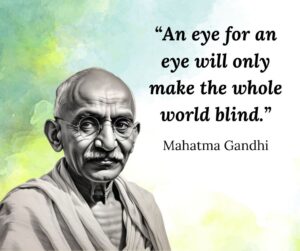Mahatma Gandhi’s profound statement, “An eye for an eye will only make the whole world blind,” resonates as one of his most powerful messages advocating for nonviolence and peaceful coexistence. Through this simple yet evocative phrase, Gandhi sought to convey the self-destructive nature of revenge and retaliation. His message urges humanity to rise above conflict, forsaking violence and vengeance for the sake of unity, peace, and progress.
In this article, we’ll explore the roots of Gandhi’s perspective, the impact of this philosophy, and how his message remains deeply relevant to both personal and global conflicts.
The Origins of Gandhi’s Philosophy of Nonviolence
Gandhi was profoundly influenced by the principles of ahimsa, a Sanskrit term meaning nonviolence, which forms the cornerstone of his philosophy. His devotion to nonviolence grew from his spiritual beliefs, particularly the idea that all living beings are interconnected and that causing harm to another ultimately harms oneself. Ahimsa was not merely a passive doctrine; it was an active choice to live with compassion, patience, and empathy in the face of adversity.
Gandhi was also inspired by the teachings of various world religions, particularly the Sermon on the Mount in Christianity, which emphasizes forgiveness and love for one’s enemies, and the concept of karuna (compassion) in Buddhism. By fusing these teachings with his personal beliefs, Gandhi developed his theory of satyagraha, or “truth-force,” which encouraged people to resist oppression without resorting to violence. In his view, truth and love were powerful forces capable of transforming even the most hostile of hearts.
The Cycle of Retaliation
Gandhi’s message that “an eye for an eye will only make the whole world blind” offers a stark warning about the cycle of retaliation that plagues societies around the world. Revenge is often a short-term solution to long-term problems, leading to a cascade of further resentment and retribution. This cycle of tit-for-tat justice doesn’t resolve issues; instead, it perpetuates them.
Consider the historical context of Gandhi’s time. As he fought for India’s independence from British rule, Gandhi understood that armed struggle would only lead to further bloodshed, fostering bitterness between Indians and the British. Instead, he advocated for peaceful protests and civil disobedience, aiming to break the cycle of oppression through nonviolent means. By doing so, he demonstrated that it was possible to resist injustice without sacrificing one’s values.
Relevance to Modern Conflicts
Gandhi’s philosophy is as relevant today as it was during his lifetime. In an age where violence and conflict remain pervasive, his message serves as a reminder of the importance of empathy, compassion, and understanding.
From family disputes to political clashes, conflicts can easily escalate when both sides adopt a retaliatory stance. In these moments, Gandhi’s warning becomes evident: when we react to anger with anger, or to violence with violence, we create an environment that fosters fear, mistrust, and hostility. This approach makes it almost impossible to find common ground, leading to divisions that may take generations to heal.
For instance, in regions affected by long-standing feuds or sectarian violence, Gandhi’s message is particularly powerful. These conflicts often endure because neither side is willing to let go of past grievances. By breaking the cycle of revenge, communities have the opportunity to pursue dialogue, reconciliation, and, eventually, peace.
Gandhi’s Message in Personal Relationships
While Gandhi’s words are frequently associated with political or societal conflicts, they also offer valuable insights for personal relationships. Many people have experienced moments when they felt hurt, betrayed, or wronged by others. The impulse to respond with similar actions can be tempting, but such responses often lead to a prolonged emotional standoff. Whether it’s a family argument, a friendship falling apart, or a relationship struggle, adopting a stance of non-retaliation can promote healing and mutual understanding.
By choosing forgiveness over retaliation, individuals can break free from a cycle of negative emotions, cultivating inner peace and well-being. Gandhi believed that forgiveness was a powerful act of courage, one that required strength and resilience. When we forgive, we free ourselves from the chains of anger and resentment, creating space for love and compassion to grow.
The Power of Compassion Over Retribution
Compassion lies at the heart of Gandhi’s message. Rather than seeing one’s opponent as an adversary, Gandhi urged people to view them with empathy, understanding the shared humanity beneath the surface. He believed that every human being has the capacity for both good and bad, and that hatred and violence only serve to cloud this potential.
Gandhi famously said, “Hate the sin, love the sinner.” By focusing on the actions rather than the person, he reminded us that people are capable of change, and that understanding the root causes of someone’s behavior can lead to more constructive solutions. In other words, by choosing compassion over retribution, we create opportunities for transformation rather than escalation.
The Path Forward: Embracing Gandhi’s Vision of Peace
In a world often marked by division, anger, and fear, Gandhi’s message serves as a beacon of hope. He demonstrated that peace and nonviolence are not signs of weakness but of profound strength. Embracing this philosophy requires a willingness to forgive, to empathize, and to see beyond our own immediate interests.
To apply Gandhi’s message in our own lives, we can start by asking ourselves a few important questions:
- When faced with conflict, can I choose patience and empathy over anger?
- Am I willing to listen to and understand the perspective of others, even when we disagree?
- Can I forgive those who have wronged me, recognizing that holding onto resentment only harms myself?
- Can I focus on constructive solutions rather than seeking revenge or retribution?
The answers to these questions can guide us toward a more harmonious approach to life, helping us to embody the principles of nonviolence that Gandhi championed.
Gandhi’s Legacy: A Call to Action
Mahatma Gandhi’s legacy is not only a philosophy but also a call to action. His message, “An eye for an eye will only make the whole world blind,” implores us to reject vengeance and embrace forgiveness. It is a reminder that we each have a role to play in creating a more peaceful, compassionate world.
Through his life, Gandhi demonstrated that nonviolence has the power to move mountains, dismantling oppression, breaking down barriers, and uniting people. His message is a timeless testament to the strength of compassion, proving that peace is not an unattainable ideal but a practical, transformative force.


















